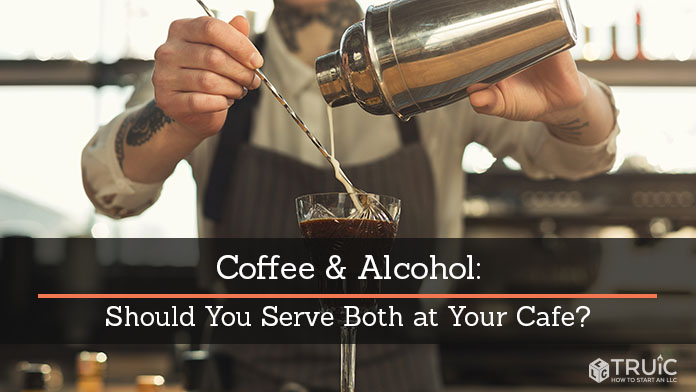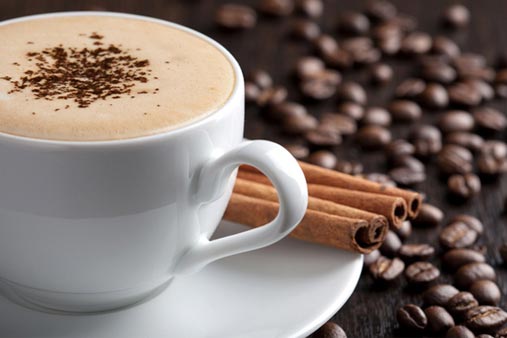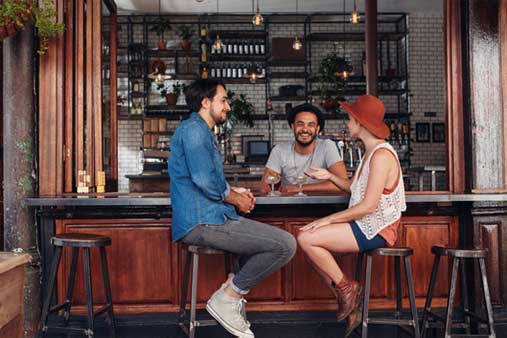Coffee and Alcohol: Should You Serve Both at Your Cafe?
Serving alcoholic beverages alongside coffee allows you to extend your business hours, combining two services in one space. However, selling alcohol often requires business owners to complete several expensive, time-consuming steps — depending on their location. To help you make an informed decision for your business, see below for the pros and cons of adding alcohol to your menu as well as the basics of serving alcoholic beverages if you decide to do so.
Recommended: Read our full, in-depth How to Start a Coffee Shop Business guides, inspired by coffee professionals, they will help make your coffee dreams real, from sourcing beans to hiring baristas, choosing the best POS system, forming an actual company, and everything in between.

Pros & Cons
As with any big business decision, there are both advantages and disadvantages to serving alcohol in a cafe:
PROS
- Extends your business hours to help fully utilize your space
- Attracts customers at a different time of day to make a second purchase — potentially doubling the profit of one customer relationship
- Increases your profits by enhancing your menu
- Helps to grow your customer base
- Provides a product with a longer shelf life than coffee, giving you more time to sell your inventory
CONS
- Requires an often expensive and time-consuming licensing process
- Increases your workload as you hire and train employees to work a bar
- Increases your labor costs because you need staff working later in the day
- Poses a challenge in transforming your cafe space into a bar-like atmosphere
Understanding State Licensing & Restrictions
Adding alcohol to your shop’s menu is not as simple as setting up a wholesale account with a distiller. Depending on your location and state regulations, you may face several challenges in obtaining a liquor license. To ensure you have the proper licensing required to serve alcohol, check with your local liquor control agency. Here are a few tips to consider as you start this process:
- Alcohol licensing costs vary greatly by state. The average cost of a liquor license can range from $12,000 to $14,000 while a license to sell just beer and wine typically totals $3,000 to $4,000. Contact your local liquor control agency to obtain the correct pricing for your state.
- Because many U.S. baristas are younger than 21, employee age requirements for serving alcohol may impact your overall staffing. Be sure to communicate with your state liquor control agency to clarify these restrictions in your area.
- Laws regarding minors in some states also can affect your customer base — potentially excluding younger customers or families. Each state has different requirements to address this so be sure to contact your local agency to discuss the steps you must take to allow minors into your establishment.
PRO TIP: It’s common to face more state regulations and fees if you want to serve liquor vs. just wine and beer. Consider serving only wine and beer first to gauge customer interest before you apply for a full liquor license.
To highlight how much alcohol laws can differ around the country, here are a few examples of state-specific regulations:
- In South Carolina, it’s illegal to sell alcohol on Sundays without a special permit.
- In Utah, customers may only order alcohol if it accompanies food — and bartenders must mix alcoholic drinks behind a curtain or wall if serving them outside of a bar or club.
- Massachusetts prohibits happy hours and drink specials. It also regulates the amount of alcohol consumption by prohibiting sales of pitchers of beer or bottles of wine to individual customers, requiring two or more people share either.
- Indiana prohibits happy hour deals on alcohol.
Transforming Your Atmosphere
Converting your space from a daytime cafe to a nighttime bar requires an adjustment to the overall atmosphere. To compete with established bars, you need your customers to feel the space they enjoy in the daytime seamlessly transforms into a place they want to spend their evenings. Here are a few ways to accomplish this:
- Choose decor that can easily move from day to night, such as tables and seating. Items like candles and tablecloths also can help you quickly change the atmosphere of your space.
- Invest in dimmable lighting to help make your business’ transformation from day to night an easy adjustment.
- Consider what time of day customers most likely will consume alcohol and plan your hours of operation accordingly. Because many coffee shops close between 3 p.m. and 6 p.m., you should extend your hours until at least 8 p.m. or 9 p.m. to give customers time to relax and enjoy themselves.
- Host special events, such as open mic nights or live music, to encourage customers to stop by later in the day and experience your space in a new way.
PRO TIP: Boost customer interest by adding a happy hour to your menu during slower times, typically in the early evening or late afternoon.
Developing Drink Recipes & Training Staff
Two other basic steps you must complete before serving alcoholic beverages in your coffee shop include developing your drink menu and training your staff to prepare them. This is where you can really leverage your creativity, keeping in mind your team’s skill level. Here are a few tips to consider when developing an alcoholic drink menu for your shop:
- Coffee cocktails make fun additions to a bar menu. Consider taking some time to test out different cocktail recipes with the coffee you already serve.
- Granita drinks may seem like an old-school idea, but they can make delicious summer cocktails a breeze for your staff. Moreover, they provide a great way to seamlessly combine alcohol and coffee.
- A well-trained staff is essential for transforming your space into a bar in the evening. If your employees don’t have previous experience making cocktails or serving beer and wine, that could hinder their ability to deliver a great customer experience. Consider conducting a training session on cocktail basics as well as creating a guide on the alcoholic drinks you plan to serve for staff to study. If you’re uncomfortable training your staff yourself, look for local bartending classes or an instructor willing to visit your shop to train your team.
PRO TIP: Cold brew coffee or cold brew concentrate makes a great addition to a cocktail for the warmer months.
Wrapping Up
Serving alcoholic beverages in your coffee shop can provide a great way to boost your profits and make the most of the space you have. Understanding your state’s licensing requirements, transforming your shop’s atmosphere, and arming your staff with appropriate training will help your business make a successful transition from day to night.
Recommended: Looking for other popular things to mix with coffee, check out our guide on CBD and Coffee.

